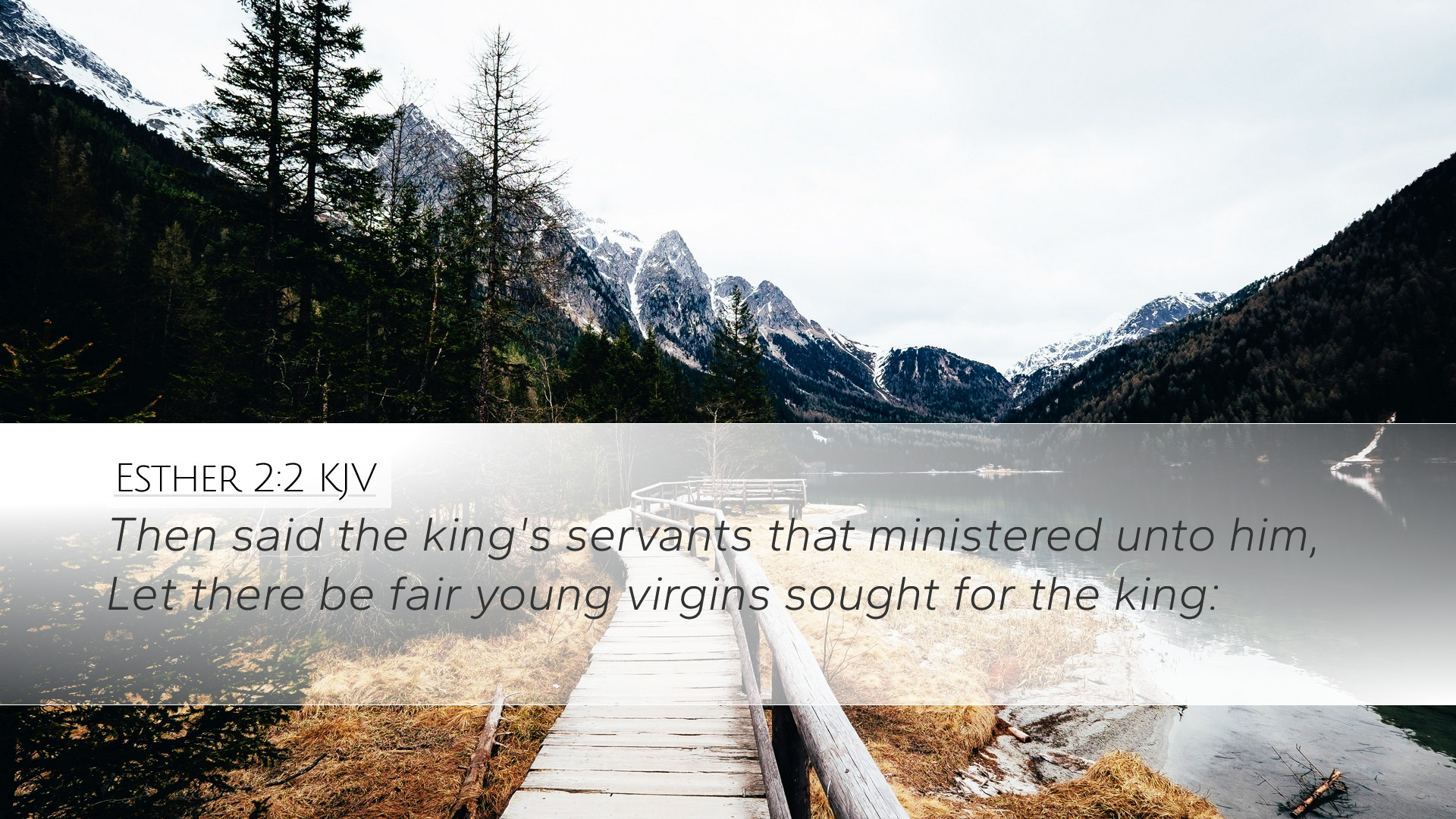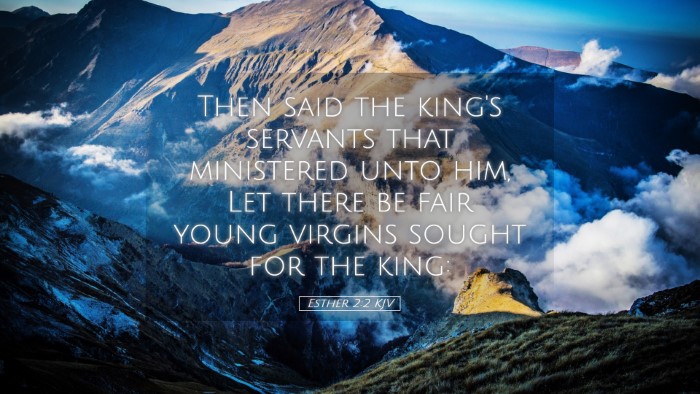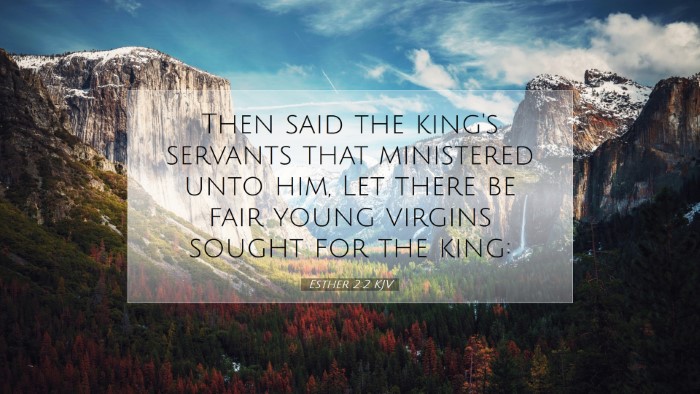Old Testament
Genesis Exodus Leviticus Numbers Deuteronomy Joshua Judges Ruth 1 Samuel 2 Samuel 1 Kings 2 Kings 1 Chronicles 2 Chronicles Ezra Nehemiah Esther Job Psalms Proverbs Ecclesiastes Song of Solomon Isaiah Jeremiah Lamentations Ezekiel Daniel Hosea Joel Amos Obadiah Jonah Micah Nahum Habakkuk Zephaniah Haggai Zechariah MalachiEsther 2:2
Esther 2:2 KJV
Then said the king's servants that ministered unto him, Let there be fair young virgins sought for the king:
Esther 2:2 Bible Commentary
Commentary on Esther 2:2
Esther 2:2 states:
"Then the king's servants who attended him said: 'Let beautiful young virgins be sought for the king.'
Overview
This verse serves as a pivotal moment in the Book of Esther, highlighting the initial steps leading to Esther's rise as queen. It presents a royal decree prompted by the king's desire to find a new queen after the banishment of Vashti.
Context and Significance
In the context of Persian law and culture, the king’s decision is emblematic of both the absolute authority of a monarch and the role of women in this narrative. The decree to collect beautiful young virgins emphasizes the fusion of beauty and virtue, a recurring theme throughout the scripture.
Insights from Public Domain Commentaries
Matthew Henry's Commentary
Matthew Henry provides a comprehensive commentary that contours the societal structure of the Persian Empire, reflecting on how power dynamics influence the lives of individuals.
- The Role of Servants: Henry notes the influence of the king's servants in this royal decision. Their suggestion marks a pivotal transition in the narrative, moving forward with the collection of potential candidates for queen. This highlight reflects how the servants held a level of agency in advising the king, despite their lower status.
- The Nature of the King's Search: The emphasis on "beautiful young virgins" signifies societal values of the time, where external beauty held substantial importance in royal selection. Henry points out the specificity of the qualifications, underscoring both the objectification of women and the demand for purity, suggesting a depth of cultural expectations.
Albert Barnes' Notes on the Bible
Albert Barnes delves into the implications of the king's actions, presenting an ethical critique of the situation.
- Assessment of the King’s Desires: Barnes discusses the moral implications of the king's quest for a new queen, indicating that it reflects both vanity and a lack of genuine regard for character. The king’s focus on external beauty over internal virtues could lead to an unstable foundation for his next marital union.
- The Influence of Circumstances: Barnes further explains how the context of the narrative influences the decisions made by both the king and his attendants. He posits that such a process could be seen as dehumanizing, reducing women to mere objects of beauty rather than individuals of worth.
Adam Clarke's Commentary
Adam Clarke offers additional insights into the sociopolitical dimensions of this verse and its broader implications.
- Understanding the Search: Clarke emphasizes the nature of the search and the criteria outlined for potential queens. He highlights that this selection process reflects a superficial understanding of leadership, where a ruler's choice is based on aesthetic rather than competency.
- Divine Providence: Clarke suggests that, despite the seemingly arbitrary nature of the king's decision, God's hand is at work in these events. He posits that the eventual selection of Esther is part of a larger divine plan, thus indicating that God can bring about significant outcomes even within a flawed system.
Theological Implications
This verse opens several theological discussions regarding the nature of God's providence, the ethical considerations of leadership, and the role of women in God’s plans.
- The Sovereignty of God: The events that unfold, beginning here, illustrate how God's providence operates through human decisions and cultural settings. While the king's actions may appear to be self-serving, they unfold into a divine narrative of salvation for the Jewish people.
- Ethical Reflections: The ethics of power and beauty are critically examined through this passage. It raises questions regarding how leaders prioritize surface attributes over true character and virtue, illustrating a moral complexity that remains relevant in contemporary contexts.
- Women's Agency: The emphasis on young women being chosen underlines their victimization but also hints at their agency. Esther’s story challenges readers to consider how women navigate oppressive structures and assert their influence through wisdom and courage.
Conclusion
Esther 2:2 serves as a foundational verse in understanding the dynamics of power, beauty, and divine providence within the narrative. The insights from various commentaries offer a nuanced perspective, enriching our understanding of the complexities within the text. As we reflect on this verse, it becomes essential for pastors, students, theologians, and scholars to consider both the cultural and divine interactions that shape our understanding of scripture.


